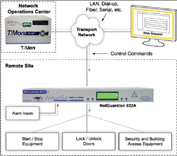Check out our White Paper Series!
A complete library of helpful advice and survival guides for every aspect of system monitoring and control.
1-800-693-0351
Have a specific question? Ask our team of expert engineers and get a specific answer!
Sign up for the next DPS Factory Training!

Whether you're new to our equipment or you've used it for years, DPS factory training is the best way to get more from your monitoring.
Reserve Your Seat Today
One of the greatest avoidable expenses in operating remote sites is the windshield time required to send technicians to your sites. You are not only paying for the high cost of the technician 's time, but your revenue-generating equipment is down much longer than it needs to be.
The capability to control remote-site equipment from your operations center is a crucial tool for avoiding windshield time. There is no reason to drive miles simply to turn a switch. Being able to activate backup equipment can make the difference between a momentary network problem and serious downtime.
The T/Mon NOC provides full support for remote control relays, including controls connected to legacy RTUs. Controls are accessed directly from the alarm display screens, and are clearly labeled in plain English, so your monitoring staff can always respond quickly and accurately to alarm events.
Remote operation of on-site equipment is even more effective when it can be done instantly without human intervention, giving you a tireless first line of defense against network failures.
That's why both the T/Mon NOC and the NetGuardian remote telemetry unit support derived controls. Derived controls are user-created formulas for automatically issuing control commands to remote site equipment in response to alarm inputs. Derived controls can correct failures before any human operator would even know something is wrong. When you compare automatic correction of alarm events to the time it takes for system operators to call a repair technician, it's clear that derived controls dramatically increase network reliability.
Derived controls, when used in conjunction with derived alarms, can provide truly intelligent alarm management. Derived alarms combine and correlate multiple alarm inputs through user-defined formulas using simple Boolean logic. You can create derived alarms for many different combinations of events, such as a failed air conditioner AND high temperature, or excessive heat OR excessive cold. You can also create derived alarms for highly complex events, even notifications for when scheduled events, like equipment self-tests, don't happen on time.
For any combination of events, you can tell the T/Mon NOC exactly what to do, and it will carry out your orders quickly and faultlessly.